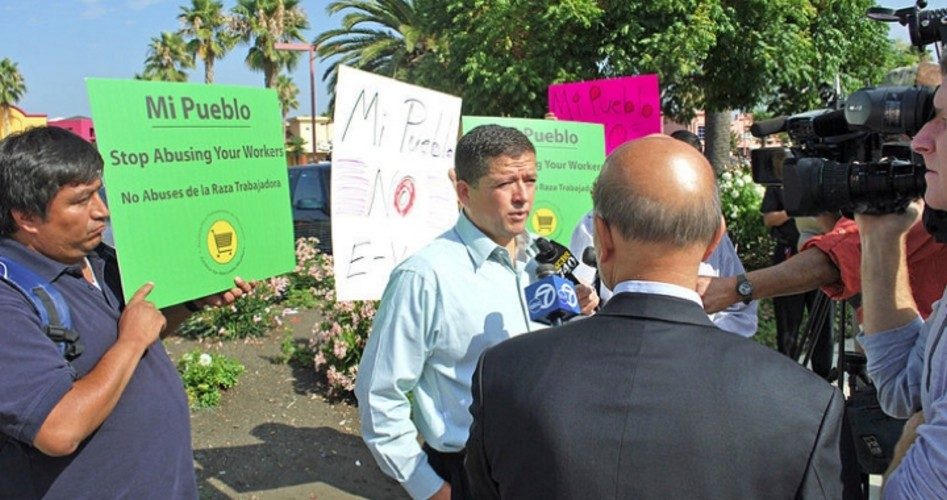
An illegal alien who became a citizen and multi-millionaire grocery tycoon is in trouble with “activists” because he is using the federal E-Verify program to check whether prospective employees are illegal aliens.
Juvenal Chavez, who own the Mi Pueblo grocery chain in California headquartered in San Jose, faces protests because, “activists” say, he has betrayed his “undocumented roots,” the San Jose Mercury News recently reported.
They, apparently, want the Mexican Hortaio Alger to ignore the law and permit illegal aliens to work.
Disloyal Mexican?
According to the News, “Mi Pueblo stunned some of its more than 3,000 employees last month when it told them it had joined E-Verify, a Department of Homeland Security program that screens the immigration status of new hires. …”
Mi Pueblo signed up for E-Verify on Aug. 14, joining more than 30,400 California employers and 109,205 work sites across the state that belong to the expanding work-verification network, according to Sharon Rummery, spokeswoman for U.S. Citizenship and Immigration Services.
The San Jose-based grocer is also among a growing number of supermarkets in the program.…
Mi Pueblo joined upon the federal government’s recommendation, said spokeswoman Perla Rodriguez, who said it was a tough decision for company executives to make.
“This is something many Hispanic grocery stores” have to deal with, she said.
Yes, it is, because the illegal immigration problem is largely a problem from Mexico. Yet the question is whether the “activists” protesting Chavez’ move to protect the integrity of his business is related to disloyalty to his illegal countrymen or whether it’s a union organizing stunt.
According to the newspaper, “armed security” booted a county supervisor from the store in what the company called a “media stunt,” after he showed up to investigate “complaints about working conditions.” It appears that union goons, the newspaper reported, are pushing the protests against the entrepreneur. They are “accusing Chavez of betraying his own undocumented immigrant roots and threatening a consumer boycott if he doesn’t pull out of E-Verify by October.” So Chavez “is fighting back in a war of words against the union and political opposition.”
The newspaper reported that “[l]abor organizers trying to unionize Latino and Asian ethnic markets across the state are attacking Chavez as a hypocrite, citing past media reports in which he revealed he came to the United States illegally from Mexico as a young man in the 1980s.”
“He comes here undocumented and now he’s going after undocumented workers,” said Mike Henneberry of the United Food and Commercial Workers Local 5. “I think that’s a little hypocritical. If it’s not hypocritical, it’s a little ironic.”
And the newspaper found the boilerplate critic, seemingly unrelated to the union, to speak against Chavez:
“That’s kind of unexpected for a store like this,” said Jonathan Rodriguez, 18, as he helped his grandmother on Thursday stuff grocery bags into her trunk at the Mi Pueblo store in central Hayward. “I don’t think that’s right. They are a Mexican food center and they should be helping their community.”
Immigrant Success Story
Mi Pueblo says critics are trying to ruin the company’s reputation, which is good one for a good reason. Chavez made it the hard way.
According to the Silicon Valley/San Jose Business Journal, the former high school teacher landed in the United States in 1984 with nothing. He and his wife, Marie Helena, came here and worked their fingers to the bone. She was a housekeeper; he a bartender. He even had a job washing test tubes in a lab at Stanford University.
But that line of work didn’t last long. He joined his brother’s taqueria, and after that, struck out on his own. Now, he runs a $300-million-a-year, 21-store empire built on service, not low prices.
“I did not build my success on ‘cheaper’ prices,” he told the business journal in 2006. He recalled:
I could not compete on that. But, I could compete by offering shoppers a better experience. That means better produce, it means understanding your demographic. For Latino families, preparing the meal is so important. They go to a specific part of the city, searching for the best meat and, then to the opposite end of the city, to a farmer’s market to buy the best chili. I understood that and tried to create a one-stop shop for them.
Coming to Mi Pueblo to buy products is second for them. The primary thing, it’s identification. Shoppers identify through Mi Pueblo by the language, the comfortable faces, the sense of nostalgia … the sense of history.
Chavez gives back to his community. He runs an annual food drive for the poor, raises nearly $300,000 annually for college scholarships and also conducts an annual fundraising drive for St. Jude’s Children’s Research Hospital. Older folks will remember that St. Jude’s was founded by the late comedian/actor, Danny Thomas, a devout Catholic.
But alas, the “activists” think Chavez has betrayed those who openly and defiantly break the law.
At least one of Chavez’s customers agrees with his using E-verify: The “law is the law,” Rafael Nuñez told the Mercury News. “In any country you go to, the law says you need papers to work.”
Photo: Protestors held a press conference in front of the Mi Pueblo supermarket on Story Road in San Jose, California, September 6, 2012.



